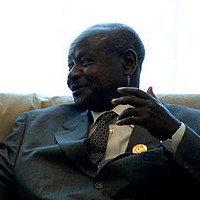A recent internal party resolution by legislators from Uganda’s ruling National Resistance Movement (NRM) all but secured yet another opening for longtime President Yoweri Museveni to represent the party without any internal challenge in the next elections in 2016. By then Museveni will have ruled the East African country for 30 years, the longest stretch by any leader in the region dating back to independence half a century ago.
A similar move in 2010 was challenged successfully in the courts, on the grounds that the party’s constitution does not provide for reserving any particular leadership position for any given person. The attempt to repeat the maneuver highlights Museveni’s—and the NRM’s—anti-democratic reflexes. In all the previous elections under the party’s rule, the opposition has cried foul over an uneven playfield, with the incumbent drawing upon all state resources to further his personal agenda, including dipping into the national treasury at will. In two out of four elections under Museveni, first in 2001 and then later in 2006, the Supreme Court found the elections to have flouted nearly every electoral law on the books.
The February resolution, which aimed “to discourage some senior leaders within the party with presidential ambitions” from pursuing them using its machinery, targeted in particular Amama Mbabazi. Currently both Uganda’s prime minister and the NRM’s secretary-general, Mbabazi is the last party member with the historical standing to potentially succeed Museveni. The resolution was accompanied by a measure stripping Mbabazi of key party roles, as well as a purge of his loyalists heading local administrative units directly charged with security, which Museveni has historically used to immobilize any opposition movements that emerge to challenge his hold on power.

